7 Important Foods for Healthy Eyes and Vision (Besides Carrots)
Key takeaway: Foods high in antioxidants are great for your eyes.
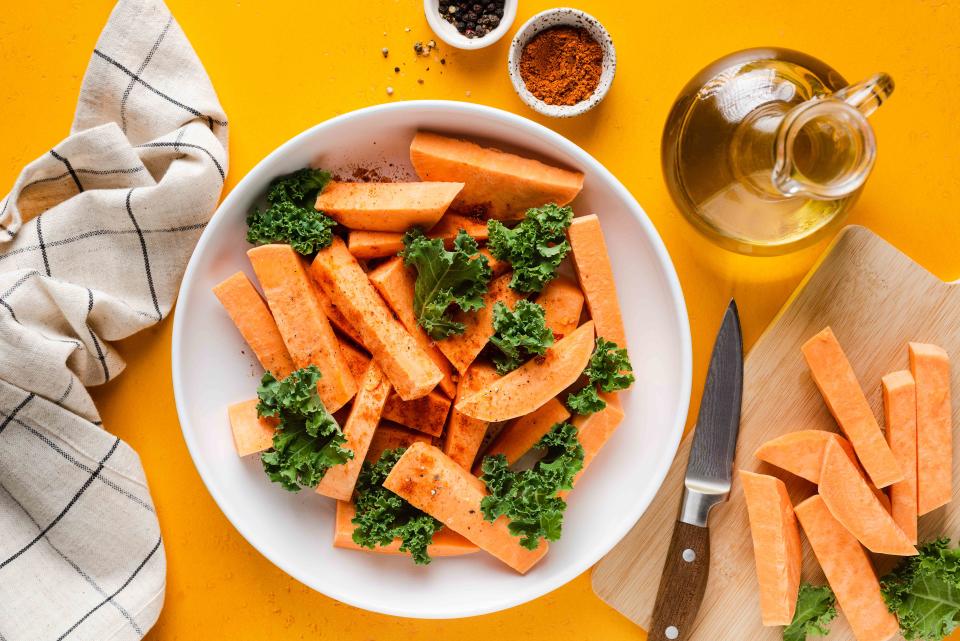
Getty Images
Fact checked by Marcus Reeves
All five senses (sight, hearing, touch, smell, and taste) are important for connecting with the world around us. However, surveys show that the general public perceives sight as the most valued sense, and it’s easy to understand why. For sighted people, the majority of our first impressions and how we perceive our surroundings are, in part, thanks to the eyes. Eyesight also plays a crucial role in learning with an estimated 80% of learning happening through the visual pathways.
Nutrition and Eye Health
Given their importance, taking care of your eyes is paramount. If you’ve always passed your eye exams with flying colors, you may take your 20/20 vision for granted or assume you’ll always have perfect peepers. Your genetics play a large role in eye health, but research suggests that age is the most common factor for common eye diseases. While you can’t slow down time, you can acknowledge the modifiable risk factors by making small changes to your lifestyle. Some of the best ways to keep your eyes healthy, according to the Cleveland Clinic, include scheduling regular eye appointments, wearing sunglasses, and eating healthy foods that are good for your eyes. That’s right—what’s on your plate can influence your vision.
“Although people may not realize, the foods you eat can impact eye health and, of course, overall health too,” says Roxana Ehsani, RD, CSSD, LDN, a Miami-based registered dietitian. “Eating a well-balanced diet can help combat eye conditions and diseases such as age-related macular degeneration, cataracts, and dry eyes.” Some nutrients are especially targeted at supporting eye health. Here’s how you can use nutrition to take care of your eyes, according to registered dietitians.
Related: 10 Important Foods That Support Hair Growth, Strength, and Health
Important Nutrients for Eye Health
Pretty much all the essential nutrients are good for your health in some way, but some work overtime for your eye and vision. You should aim to eat a wide variety of nutrient-dense foods, but if you want to know which are best for your vision, keep reading.
Both the American Optometric Association (AOA) and the American Academy of Ophthalmology (AAO) recommend the following key nutrients to support eye health:
Lutein and zeaxanthin: antioxidants primarily found in dark leafy greens that can reduce the risk of cataracts and other chronic eye diseases.
Vitamin C: an antioxidant found in lots of fruits (and veggies!) that can slow the progression of age-related macular degeneration and visual acuity loss.
Vitamin E: an antioxidant found in vegetable oils, nuts, and veggies like sweet potatoes that protects healthy eye tissue from free radical damage
Zinc: an essential mineral found in seafood and nuts that can protect against impaired vision and cataracts
Omega-3 fatty acids: essential fatty acids also found in fatty fish, nuts, and seeds that are also crucial for healthy eyes and support visual development and tear glands
Related: 6 Exceptional Superfoods to Eat for a Strong, Healthy Immune System
Antioxidants are key.
What do these nutrients have in common? Besides omega-3s, they’re all antioxidants or have antioxidant properties. And according to the dietitians we spoke to, antioxidants are the best nutrients for eye health. “The eyes are sensitive to oxidative stress,” says Kim Kulp, RDN, a registered dietitian in San Francisco. “Oxidative stress can cause eye diseases, so antioxidants can help protect eye health and reduce the risk of diseases like glaucoma and diabetic retinopathy.”
Great Foods for Eye Health
Salmon
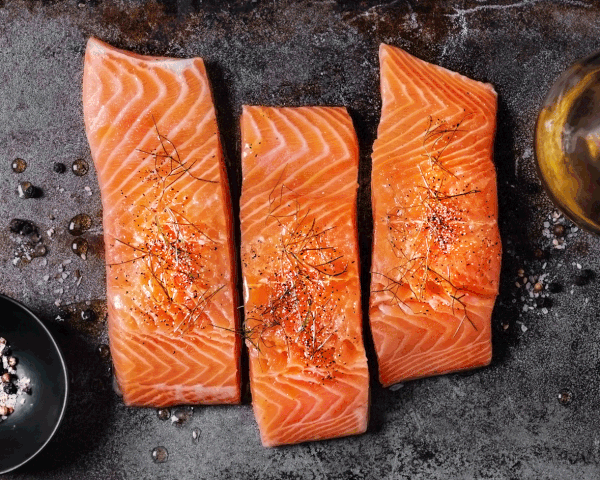
Getty Images
Commonly associated with brain health, the omega-3 fatty acids known as docosahexaenoic acid (DHA) and eicosapentaenoic acid (EPA) are also vital for eye health—and salmon is full of them.
“Fatty fish are high in DHA and EPA, which have been shown to provide a benefit to eye health as early as in the womb,” Ehsani explains. “During fetal development and in the first few days of life, the eyes become enriched with omega-3 fatty acids, especially DHA.” Expecting mothers can get a jumpstart on their baby’s eye health by eating salmon during pregnancy.
While the eye benefits of DHA and EPA found in salmon start kicking in before birth, their importance continues throughout life. “In people with diabetes, two servings per week of oily fish like salmon, tuna, mackerel, and sardines has been shown to reduce the risk of damage to the retina from diabetic retinopathy,” Kulp explains.
Wild sockeye salmon is one of the richest food sources of DHA, Ehsani says, adding that it’s also a food source of vitamin A and zinc, other nutrients that are beneficial for the eyes. “Few other foods will provide the same combination of eye-healthy nutrients,” she says.
Broccoli
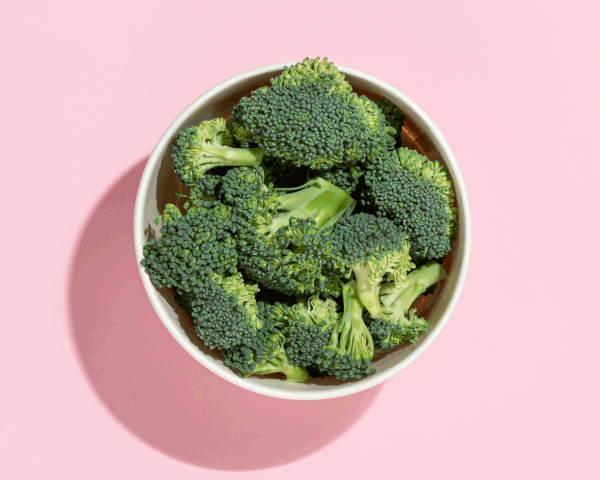
Getty Images
There are so many health benefits of broccoli, including its ability to protect eye health. For starters, it’s overflowing in vitamin C, an antioxidant that reduces oxidative stress in the eyes and helps prevent cataracts, research shows. A cup of raw broccoli contains 81.2 milligrams (mg) of vitamin C, which is about 90% of the daily value for men and more than 100% for women. Broccoli is also a good source of vitamin A. Its antioxidant load may help prevent age-related macular degeneration, per a July 2023 review.
The antioxidant content in broccoli is nothing new, but a less popular nutrient called sulforaphane may also boost its eye benefits, notes Lexi Moriarty, RDN, CSSD, a registered dietitian in Westfield, New Jersey. “Sulforaphane has an impact on certain disease processes and has been shown to have a positive impact on disease progression in common eye disorders like glaucoma.”
Related: How to Cook Broccoli 8 Different Ways—Including Grilled, Roasted, and More
Sweet Potatoes
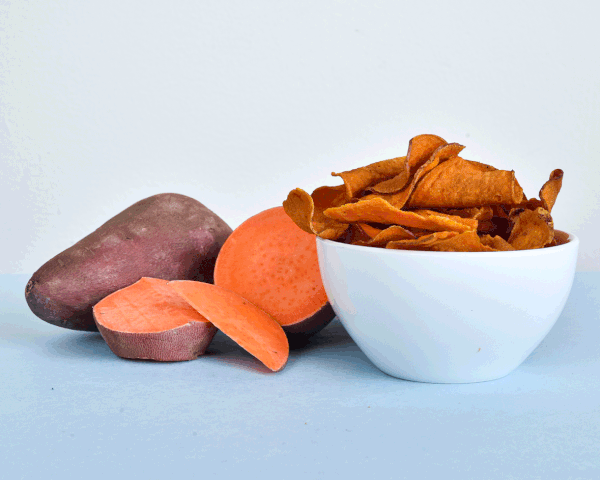
Getty Images
Carrots have long held the title of the best food for eye health. This is because carrots are rich in beta-carotene, the pigment that gives orange vegetables their vibrant hue. Carrots are certainly high in beta-carotene, but sweet potatoes actually contain more of this beneficial pigment. A serving of boiled carrots provides 8.3 mg of beta-carotene, while the same portion of baked sweet potato contains 11.5 mg of the nutrient.
“Beta-carotene is beneficial because the body converts it to vitamin A, which is essential for good vision,” Ehsani explains. The beta-carotene in sweet potatoes helps your eyes adjust in low light, she adds.
To get the most beta-carotene and vitamin C from sweet potatoes, the Harvard T.H. Chan School of Public Health recommends boiling them with the skins.
Related: Raw Is Not Always Better—These 4 Vegetables Are Healthier When Cooked
Walnuts
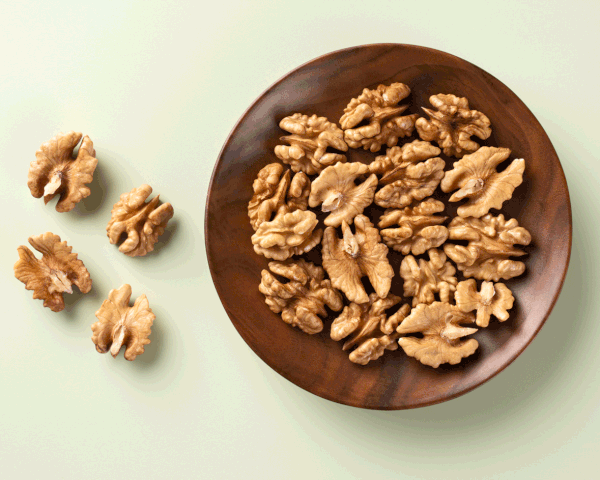
Getty Images
Nuts are excellent foods for healthy eyes and vision because they’re rich in nutrients like vitamin E, zinc, and omega-3 fatty acids. They specifically contain the plant form of omega 3s, alpha-linolenic acid (ALA), Kulp says. ALA can then be converted to DHA and EPA by the body, so walnuts are a good source of omegas for vegans and vegetarians who don’t eat fatty fish.
The ALA in walnuts may be especially beneficial for those with diabetes-related eye issues. ALA may help improve dry eye disease and retinopathy in people with diabetes, research shows. High blood sugar can negatively affect blood vessels in the eyes, so fiber-rich foods that help stabilize blood glucose levels can further improve eye health in those with diabetes, Kulp explains.
Besides these nutrients, Kulp calls out vitamin E, an antioxidant commonly found in healthy fats. The vitamin E and other polyphenols in walnuts help reduce inflammation and protect against free radical damage, she says. Walnuts also provide zinc, a mineral that’s highly concentrated in the retina.
Egg Yolks
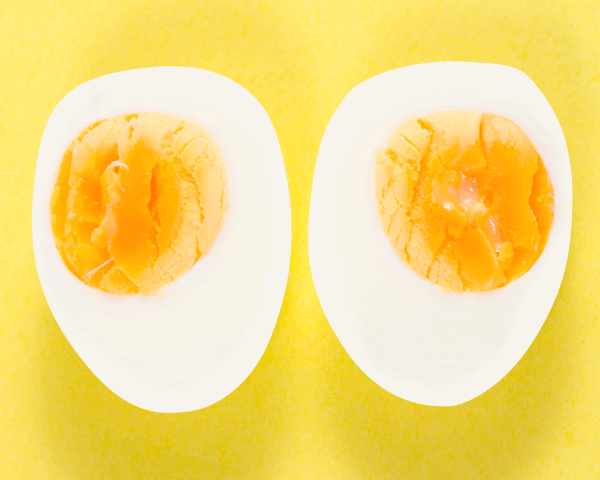
Getty Images
One of America’s favorite breakfast foods, eggs may be a good choice for supporting your eyes. “Egg yolks are a highly bioavailable source of a type of carotenoid known as lutein,” Moriarty explains. “Lutein has been shown to decrease age-related macular disease.”
The moderate consumption of eggs significantly reduces the risk of developing incident late-stage, age-related macular disease, according to a 15-year cohort study published in February 2020.
As one of the top nutrients for eye health, the benefits of lutein don’t stop there. Both lutein and zeaxanthin, another carotenoid found in eggs, can improve low macular pigment in older adults. This is one of the risk factors for age-related macular degeneration, which causes gradual and sometimes complete vision loss over time. Mortiarty points to an older study that found a link between egg consumption and an increase in macular pigmentation in older adults.
Egg yolks are also a source of other eye-healthy nutrients like zinc and vitamin A.
Kale
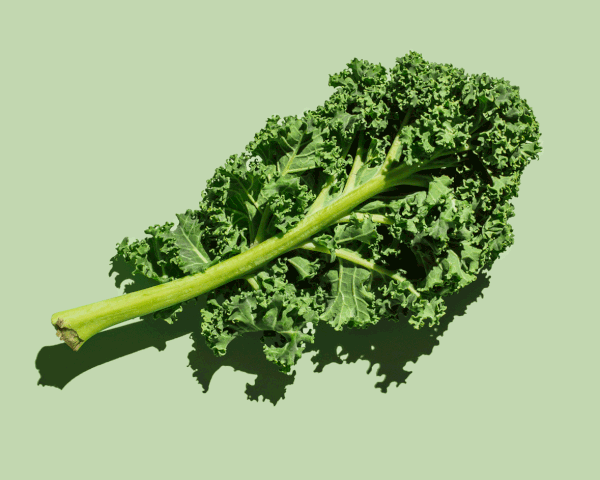
Getty Images
The Academy of Nutrition and Dietetics names kale as one of the best foods for eye health, as well as other dark leafy greens like collard greens, turnip greens, and spinach. Similarly, the National Eye Institute suggests that kale is even better for your eyes than carrots.
Kale is especially potent in the antioxidants lutein and zeaxanthin, so it could help reduce sun-related damage to eye tissue and reduce the risk of age-related eye issues. Moriarty recommends lutein-rich leafy greens like kale, noting that these carotenoids can help reduce the risk of eye diseases that can lead to irreversible blindness.
Saffron
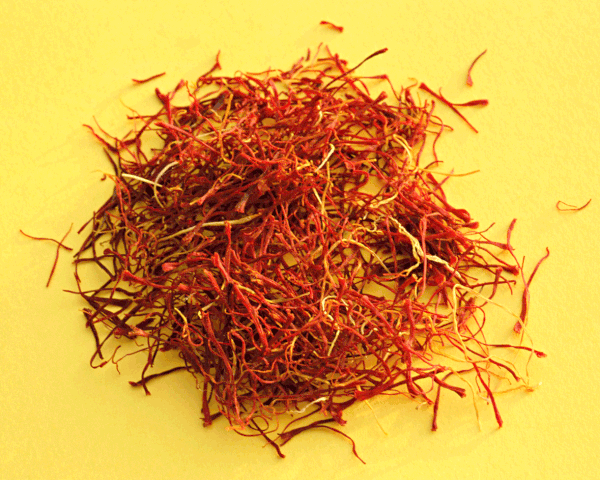
Getty Images
Saffron is a bright red herb that comes from the saffron flower. It’s very labor-intensive to harvest, since each flower only produces a few threads of saffron, and therefore on the pricier side, but if you can get your hands on it, it’s one of the best foods for eye health.
“Saffron plays a number of roles in protecting eye health,” Kulp says. “It’s been shown to reduce intraocular pressure in glaucoma, protect the retina in those with high blood pressure, and improve vision in those with early-stage macular degeneration.”
Unsurprisingly, saffron contains compounds that have antioxidant properties, which may help explain its many eye benefits. According to an August 2020 review, there are many studies supporting the therapeutic abilities of saffron to help treat ocular diseases like age-related macular degeneration and glaucoma.
Related: 5 Spices That Not Only Taste Good, They're Good for You
Ultimately, no single food is going to give you superhuman vision—a balanced diet, full of a variety of plant foods, proteins, and healthy fats, is best for eye health. “Diets that include plenty of fruits and vegetables, fatty fish, nuts, and legumes are said to decrease the chance of eye disease later in life,” Mortiarty says.
For more Real Simple news, make sure to sign up for our newsletter!
Read the original article on Real Simple.

